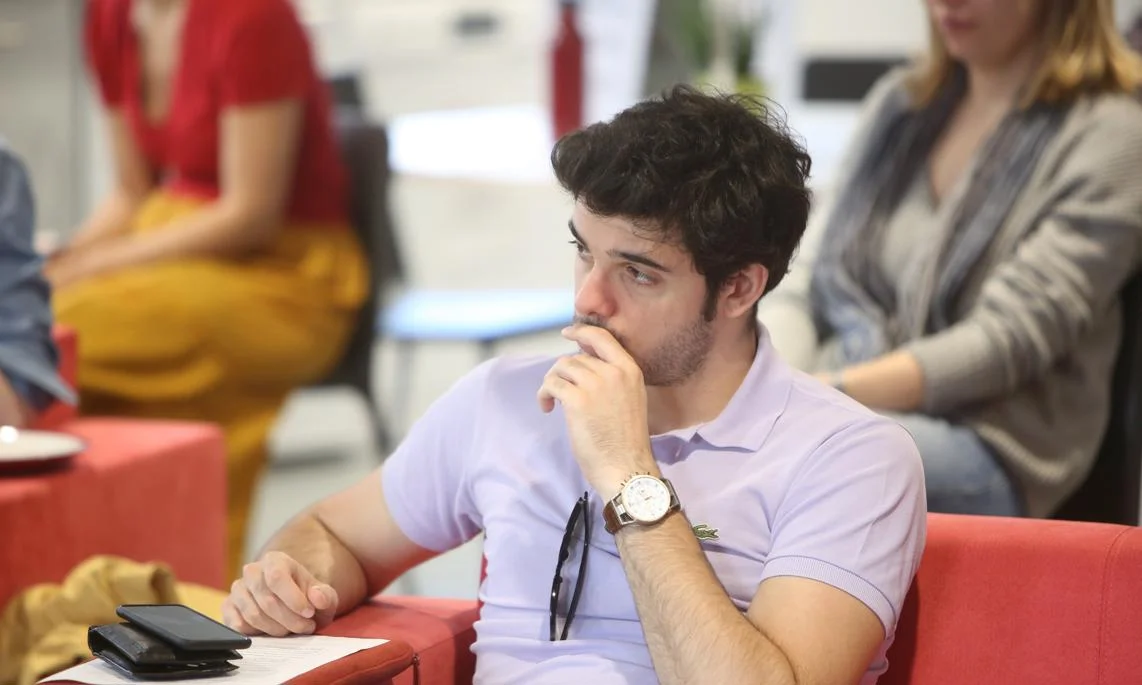Overview
Introduction
The programme
On this programme, you’ll gain the quantitative and qualitative skills to contribute robust socio-technical research to the field of digital innovation, with the opportunity to specialise in your chosen area. As you progress, you’ll learn how to define problems and research questions, collect and analyse data, and apply your empirical observations to develop theoretical ideas.
You’ll begin your studies on the MPhil and move on to the PhD (subject to satisfactory progress).
Students can apply for LSE and departmental financial support, including a full tuition award and a five-year annual stipend granted each year to at least one exceptional candidate applying to this programme. Find out more below under "Scholarships, studentships and other funding".
Research environnment
LSE’s Information Systems and Innovation Faculty Research Group is one of the largest of its kind in the world. We have wide-ranging research strengths, with expertise in digital ecosystems, organisational technologies, security and privacy, health and financial services. During your studies, you’ll have the chance to complete a substantial piece of original research in your chosen field.
LSE is a globally renowned research university ranked sixth in the world for social sciences and management. As a student, you’ll be joining a world-class community of academics and doctoral students who contribute to pioneering research in various management disciplines.
We're also ranked second in the UK by percentage of overall four and three stars in the most recent Research Excellence Framework (REF 2021).
Preliminary readings
- Cristina Alaimo, Jannis Kallinikos (2024) Data Rules: Reinventing the Market Economy, MIT Press, Cambridge, MA, 2024.
- Robert Galliers Mari-Klara Stein The Routledge companion to management information systems, Taylor & Francis, Abingdon, Oxon Routledge, 2018
- Robert D Galliers (Ed) & Wendy Currie (Ed) The Oxford Handbook of Management Information Systems: Critical Perspectives and New Directions (Oxford Handbooks) Hardcover, 2011
- Boyka Simeonova (Ed) & Robert D. Galliers (Ed) Cambridge Handbook of Qualitative Digital Research, 2023
Entry requirements
2:1 bachelor’s degree or equivalent in computer science or a social science discipline, plus high merit (65+) in a master’s degree or equivalent in information systems or management or a related discipline.
See the GRE/GMAT requirements for this programme below under "Additional tests".
Please select your country from the dropdown list below to find out the entry requirements that apply to you.
Overseas
Additional tests
GRE/GMAT requirement
GMAT or GRE is recommended, but not mandatory. It must be no more than five years before 1 October 2026, and must show full and percentile scores for all sections.
English language requirements
The English language requirement for this programme is Research. Read more about our English language requirements.
Competition for places at LSE is strong. So, even if you meet the minimum entry requirements, this doesn't guarantee you an offer of a place.
However, please don’t feel deterred from applying – we want to hear from all suitably qualified students. Think carefully about how you can put together the strongest possible application to help you stand out.
Programme content
You'll work closely with international and world-class faculty as part of a vibrant community of doctoral students, all of whom are pursuing varied research in different fields of management. The programme includes:
- a comprehensive qualitative and quantitative training
- studies from a wide variety of countries
- and the opportunity to specialise in a designated field.
Year 1
In your first year you'll take:
- taught courses in qualitative and quantitative methodology and analysis
- one additional specialist methods courses depending on your research needs
- two specialist courses to deepen your knowledge of current research practices and theoretical approaches in Information Systems and Digital Innovation
- the seminar Social Sciences Perspective of Academic Research in Management, which will help you understand the diversity of specialisms within the department and strengthen your critical analysis skills
You'll engage in short duration research projects, called Research Practicums, with different members of Faculty. The rotation of practicum assignments will include one-to-one training and collaboration that provides you better understanding of the research process, such as:
- literature reviews
- applied research methods
- data analysis
- evaluating findings and implications.
It will also give the opportunity to interact and get to know different members of the faculty group.
Each week during term time you'll attend the Information Systems Seminar, hearing from a range of academic speakers from within the Faculty Group, student researchers and external speakers.
Year 2
In the Autumn Term of your second year, you'll prepare and submit your PhD Proposal. It'll be examined in the form of a viva with a panel from the Faculty Group.
Once you've upgraded to PhD you work on your research and writing. You'll have the opportunity to undertake further training if needed and participate in the Advanced Quantitative Analysis for Research in Management with other students on different programmes. You'll continue to attend the Information Systems Seminar and be encouraged to engage with research events and conferences.
Years 3 and 4
During the third and fourth year of your programme you'll continue to meet regularly with your supervisors. You'll focus on your PhD Thesis, research and writing papers for presentation at conferences and publication and continue to participate in your Faculty Group seminars. Your progress will be monitored, and you'll be asked to present to the Faculty Group and your supervisors during the year.
At the end of your third year, you'll present your final year plan which outlines your timetable to completion and submission of your thesis, and actively engage and promote yourself in the Job Market.
Why study with us
Discover more about our students and department.
Meet the members of the Information Systems and Innovation faculty
Meet the department
Our mission
Welcome to the Department of Management. Our mission is to inspire superior management practices by fostering a comprehensive understanding of individuals, teams, organisations, and markets, along with the psychological, social, political, and technological contexts that influence them.
By studying with us, you'll gain access to a world-leading centre for education and research, uniquely positioned within a world-class social science institution at the heart of a truly global city.
The environment
Join a vibrant intellectual community comprising of world-renowned faculty, astute students, dedicated and responsive professional services staff, and high achieving alumni. Through pioneering research and high-level teaching, you'll receive comprehensive, intensive, and rigorous methodological training to help you become an expert in your specialist fields.
The rich and culturally diverse learning environment at LSE’s Department of Management, won't only enrich your experience through developing a broad perspective and understanding, but also unlock an invaluable network of global peers.
Create a better world
We go beyond the boundaries of a traditional business school by integrating diverse disciplines such as economics, marketing, data, and analytics. Our comprehensive approach ensures that students gain a profound and multifaceted understanding of the business world, equipping them with the skills and knowledge to excel in a dynamic global environment.
Join us in our vision to create a better world, where a profound understanding of management drives positive change in both business and society.
Discover more about our programmes and research.
Who's who

Why LSE
University of the Year 2025 and 1st in the UK in 2025 and 2026
Times and The Sunday Times - Good University Guide 2025 and 20261st in London for the 14th year running
The Complete University Guide - University League Tables 20266th in the world for the study of social sciences and management
QS World University Rankings by Subject 20256th in the world for leading the way in social and environmental sustainability
QS World University Rankings: Sustainability 2026Your application
We welcome applications for research programmes that complement the academic interests of members of staff at the School, and we recommend that you investigate faculty research interests before applying.
We individually evaluate each application and carefully review all the details you provide in your application form. We consider the following as part of your application.
Overview
When to apply
The application deadline for this programme is 14 January 2026.
If you’d like to be considered for any funding opportunities, you must submit your application (and all supporting documents) by this application and funding deadline.
See the fees and funding section below for more details.
Fees and funding
The table of fees shows the latest tuition fees for all programmes.
You're charged a fee for your programme. Your tuition fee covers registration and examination fees payable to the School, lectures, classes and individual supervision, lectures given at other colleges under intercollegiate arrangements and, under current arrangements, membership of the Students' Union. It doesn't cover living costs or travel or fieldwork.
Home
Home student fee (2026/27)
The fee is likely to rise over the full duration of the programme. The School charges home research students in line with fee levels recommended by the Research Councils.
Learn more about fee status classification.
Overseas
Overseas student fee (2026/27)
The fee is likely to rise over the full duration of the programme in line with the assumed percentage increase in pay costs (ie, four per cent each year).
Learn more about fee status classification.
Learning and assessment
How you learn
How you're assessed
Progression and assessment
Successful completion of work required for each year is a necessary condition for re-registration in the following year. You'll need to meet certain criteria, such as achieving certain grades in your assignments.
During the second year of registration, you submit a research proposal for your upgrade to PhD.
You're required to complete your PhD thesis within four years and should allow three to six months for revisions and submissions.
Your final award will be determined by the completion of an original research thesis and a viva oral examination.
Graduate destinations
Overview
Students who successfully complete the programme often embark on an academic career.
Career and placements of previous Department of Management PhD students
Teaching
The department aims to give all qualified doctoral students the opportunity to teach. Developing teaching skills and experience is an important component of the students' career development and prepares you for future academic roles. To make this experience as valuable as possible we draw on the support from the LSE's Teaching and Learning Centre.
Further information on graduate destinations for this programme
Career support
You'll receive advice, information and strategic guidance on how to approach and prepare for the academic job market during your programme.
Throughout the programme, you're expected to participate in Information Systems and Innovation Faculty Research Group research workshops, enabling you to grow familiar with the process of presenting and discussing academic papers with experienced faculty, and provide opportunities for networking. Funding is also available for you to attend and present papers at academic conferences.
LSE Careers has a team dedicated to PhD students offering a wide range of resources and advice. You'll receive regular updates on career events and workshops offered by LSE Careers and the LSE’s PhD Academy. Research based employment opportunities are communicated to students in our newsletters and email updates.
All career services are available to PhD students, and for PhD alumni for up to five years after completing your PhD.
Browse LSE’s wide range of services for PhD students and research staff.

